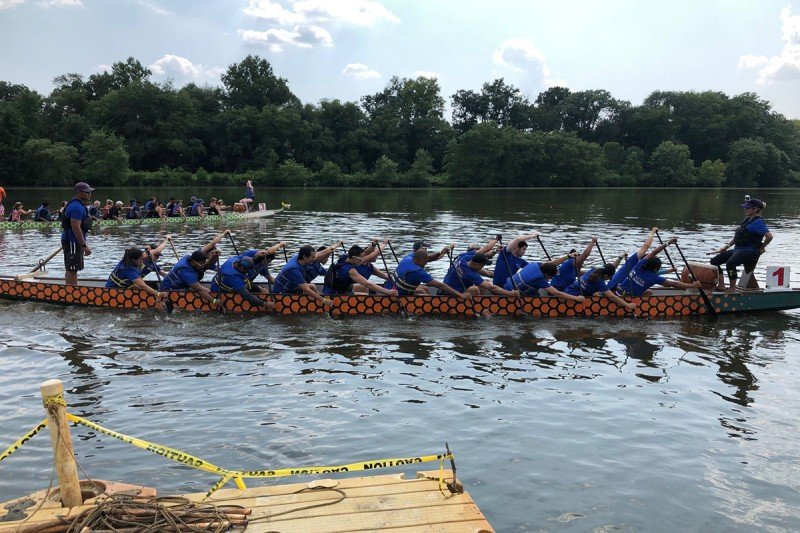
You sometimes hear the steady beat of the drum before you see the boat.
An imposing figure then comes into view, slicing through the water. It’s a multicolor 40-foot canoe.
Finally, you hear the paddlers’ yells of encouragement: “Come on, faster. We can do this!”
Welcome to dragon boat racing.
Imagine Dragons
Dragon boat racing has its roots in ancient Chinese culture. It emerged two centuries later — in the 1980s — as a fast-growing global sport. Today, it has about 50 million participants in China and Hong Kong and another 400,000 across Europe and the Americas, according to The New York Times.

James Lozada, coach of the MSK Dragons and clinical research auditor
Among the enthusiasts are the MSK Dragons, the dragon boat team at Memorial Sloan Kettering Cancer Center (MSK). Founded in 2012, the team is the brainchild of the Employee Wellness Group and James Lozada, an MSK clinical research auditor.
Before the Dragons, James raced with another team. He became enamored after seeing boats race at the annual Hong Kong Dragon Boat Festival in Queens, New York.
Dragon boats typically hold 22 people: 20 paddlers, a drummer (to keep everyone in sync), and a helmsperson.
James recalls, “I took one look at those paddlers and asked, ‘How do I do that?’ ”
The Mother (Mantra) of Dragons
MSK’s team consists of employees from across the organization, including nurses, doctors, fellows, administrative assistants, and IT specialists.
Through the Dragons, Maureen O’Brien, a clinical nurse for MSK’s Tobacco Treatment Program, says she met colleagues she would not have come across otherwise.
“Nursing was my world — it’s all I knew,” says Maureen, who has worked at MSK for almost four decades and joined the team in 2012. “Suddenly, I was meeting these incredible people for the very first time. It was exhilarating.”

Members of the MSK Dragons hiked the Balanced Rock in Colorado Springs, Colorado.
All staff is welcome to join, as long as they are “willing to work hard,” says James, the team’s coach, adding that the team’s mantra is “Protect the culture, trust the process, honor your commitment.”
At the beginning of each season, each member is asked to set a wellness goal. Initially, Maureen’s aim was to lose weight and get in shape after a hip replacement. While Maureen’s goals have evolved over the decade, she revels in the strength she’s built.
“Do you know how empowering it is for me — an older woman — to manage a tough practice, and be able to handle the paddle?” she asks. “It makes you feel mighty.”
The Beat Goes On
Before the pandemic, the Dragons raced May to October, competing against other healthcare institutions and corporate teams from across the Eastern region. They also trained three times a week at the World’s Fair Marina in Queens.
But COVID-19 changed everything.
“Many of us have been working from home and haven’t seen one another in person for two years,” James says. “It’s been difficult because we are such a tight-knit group. You miss the camaraderie.”
Earlier this month, the team held its first in-person practice since the pandemic began. Taking to the water again was like a family reunion.
While the team trains for its first race of the season, on June 4 in Philadelphia, it has other priorities. Chief among them: rebuilding its roster. Prior to the pandemic, there were 50 Dragons. Half have left, as staff have juggled more work-life responsibilities in the past two years or moved on from MSK.
The Importance of AANHPI Heritage Month
James, who is of Filipino descent, reflects on the Dragons’ return. He says it is fitting the team reunited this month after a two-year hiatus, as May is Asian American, Native Hawaiian, and Pacific Islander (AANHPI) Heritage Month.
“Dragon boat racing has such deep ties to the Chinese and Asian communities,” he says. “It is an awesome way to honor tradition and educate people about the cultures.”

The MSK Dragons celebrate winning the 2019 Healthcare Cup.
Both James and Maureen say they appreciate this ancient craft for another reason: the life lessons it imparts.
Anyone who has mastered dragon boat racing knows this: Paddling takes teamwork. To move forward, you must be in sync.
“To win as a team, you have to learn how to listen to each other, overcome challenges, and work together,” says Maureen. “Out of the boat, we all have our differences and we always will — cultural, religious, political. But when we’re in the boat, we are one.”